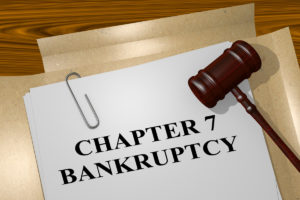What Will It Accomplish for You? What Are the Limitations?
 If you’re facing financial challenges, whether you’ve lost your job in the pandemic, suffered an unexpected injury or illness, or gone through a costly divorce, you may be considering a personal bankruptcy filing to help you get a fresh start. That’s what the laws are there for.
If you’re facing financial challenges, whether you’ve lost your job in the pandemic, suffered an unexpected injury or illness, or gone through a costly divorce, you may be considering a personal bankruptcy filing to help you get a fresh start. That’s what the laws are there for.
One of the first things you’ll discover, though, is that there are two primary types of personal bankruptcy filings: Chapter 7 liquidation and Chapter 13 reorganization. What is a Chapter 7 bankruptcy filing? What are its advantages and disadvantages? What are its limitations?
What Is a Chapter 7 Bankruptcy Filing?
A Chapter 7 bankruptcy petition is a legal document, filed with the bankruptcy court, that asks the court to permanently discharge some of your debts. That means that you’ll never be legally required to pay any portion of them again.
How Does a Chapter 7 Bankruptcy Work?
When you file for protection under Chapter 7, you have the right to have certain debts discharged. In exchange, you must turn over some of your personal assets to the bankruptcy trustee, to be sold to satisfy your creditors. Some debts, such as child support, may not be discharged in bankruptcy. Others, such as student loan payments and most types of tax obligations, are extremely difficult to discharge. The most common types of debt discharged in Chapter 7 are medical bills and credit card obligations.
You won’t have to worry, either, that the bankruptcy trustee will take all your property. There are exemptions available, under both state and federal laws, that allow you to keep a certain amount of value in your home, car and other assets.
In addition, when you file a Chapter 7 petition, you’ll be immediately protected by the “automatic stay,” which prohibits your creditors from calling, writing or making any other attempt to collect the debt from you, except through the bankruptcy proceeding.
Contact an Experienced Rockwall, TX Bankruptcy Attorney
At the Law Offices of Carrie Weir, all potential clients are entitled to a free initial consultation. To arrange an appointment, contact my office online or call 972-772-3083. I handle Texas personal bankruptcy filings in Kaufman County, Rockwall County, Collin County, Dallas County, Hunt County and the surrounding counties.







